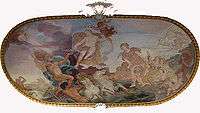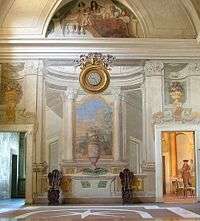Villa Falconieri
Coordinates: 41°48′26″N 12°41′22″E / 41.8072139°N 12.6895417°E



The Villa Falconieri is a villa in Frascati, Italy.
History
The villa was originally called Villa Rufina, having been was initially built by Monsignor Alessandro Rufini. Later it was enlarged thanks to Pope Paul III, dates back to 1546. In 1628 Orazio Falconieri purchased the villa and commissioned Francesco Borromini to oversee its renovation. His aim was for he and his brother, Cardinal Lelio Falconieri, to be buried there[1]
Important architects worked on the design such as Antonio da Sangallo the Younger and Borromini. The interior houses frescoes by Pier Leone Ghezzi, Giacinto Calandrucci, Ciro Ferri, Niccolò Berrettoni, and others. The park is a splendid Italian gardens enlarged in the 17th century, with small lake bordered by cypresses created in the 18th century.
Modern history
Later, in 1905, the Villa was bought by the German baron Ernest Mendelsshon-Bartholdy of Berlin, who in 1907 gave it as a gift to emperor Wilhelm II. On April 6, 1911 the Crown Prince William and Princess Cecilie visited the villa and decided on some restorations. Here the German writer Richard Voss lived (25 years) and wrote several novels as Villa Falconieri, Roman Fever, The Son of Volsca and others; he called the Villa as "my shining house". For these reasons Villa Falconieri was always dear to the German community of Rome.[2]
In 1921, the Villa was expropriated by Italian State. Villa Falconieri was damaged by bombing during World War II but masterly work restored its previous splendor.
Modern use
Villa Falconieri is now the headquarters of the Vivarium Novum Latin accademy
